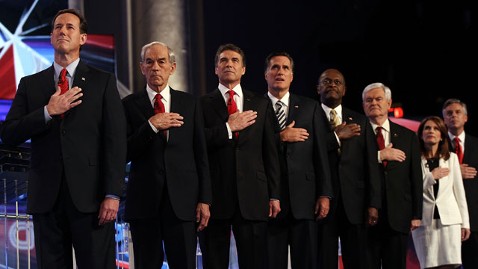Religion Powerful Force in 2012 Race

Win McNamee/Getty Images
Religion and politics may not always mix well together, but that's not the case for Republican candidates.
Virtually all of the candidates for the 2012 GOP presidential nomination have spoken candidly about their faith. In fact, many like Rep. Michele Bachmann and Texas Gov. Rick Perry have made it a central feature of their campaigns. Even Mitt Romney, who has mostly attempted to steer clear of questions about his Mormon faith, has said that if an affirmation of his faith sinks his candidacy, "so be it."
Though the United States is a secular state and there's no informal religious test for office, religion plays an important role in the minds of the American electorate. And voters, in many ways, view their leaders through a religious lens, experts say.
"Religion always remains a significant factor in elections," said Melissa Deckman, a political science professor at the Washington College. "I think there is a litmus test" for office.
In a recent Public Religion Research Institute survey, two-thirds of voters said it is very important or somewhat important for a presidential candidate to have strong religious beliefs. As a further evidence of the importance of a candidate's faith, two-thirds of voters in the poll said they would feel somewhat uncomfortable with an atheist president.
For Republicans particularly, the link between the two is important. The majority of Americans who attend church on a regular basis have historically leaned Republican, and that trend has stayed consistent in recent years, experts say.
"Self-described evangelicals are overwhelmingly supportive in presidential elections of the Republican party because, by and large, conservative Christians see the Republican party as the vehicle for the way that they view public policy," said Tim Goeglein, a former special assistant to President George W. Bush on faith issues, and currently the vice president for external relations at Focus on the Family."That has been true in the contemporary presidency since the Jimmy Carter-Ronald Reagan election of 1980."
Over the years, evangelical Christians and Catholic groups have cemented deep ties within the GOP and are considered a key voting bloc, especially in early primary and caucus states. So it's no surprise that candidates are courting them ahead of the primaries and caucuses.
Candidates "perceive that they can attract votes by making religious appeals," said John Green, a political science professor at University of Akron and a senior fellow at the Pew Forum on Religion & Public Life. But "if the past is any guide, once we get beyond the nominations into the fall election, we'll have a different set of messages."
The current set of candidates, however, pose somewhat of a challenge for the Republican religious right. Romney has frequently been the frontrunner in the GOP pack but evangelical groups view his Mormon faith with skepticism, as illustrated in a recent Pew report that found Romney garnering only 17 percent of the evangelical Protestant vote.
But evangelical groups' favorites have fallen flat when it comes to questions of moral values. Herman Cain - once the top choice of evangelicals - tumbled in the polls and eventually dropped out of the race because of multiple allegations of sexual harassment and a claim of an extramarital affair, all of which combined to virtually drain up his support among religious voters despite his conservative credentials.
Newt Gingrich's three marriages and an extramarital affair have also cast some doubt in religious voters' minds. Whether the former House speaker can overcome those questions of moral value remains to be seen.
Gingrich's public discussion of his faith, his conversion to Catholicism and his acceptance of past actions could help improve his image in the eyes of voters. Still, issues of moral and family values are top agenda items for conservatives, and it may be difficult for many to overlook those questions of moral bounds and personal behavior.
"In the past, those voters have been very skeptical of candidates whose personal behavior hasn't lived up to this standard," Green said. "For a lot of traditionally religious voters, with Newt Gingrich they may be a bit conflicted. On the one hand, his past behavior doesn't line up with what they believe in. On the other hand, he has made this claim about a change of heart with regard to his faith."
Conservative groups say it could be difficult for Christian groups to overlook Gingrich's issues of infidelity and multiple marriages. At the same time, he is more open to talking about his faith than the last Republican presidential candidate, John McCain.
McCain "was less likely to bring it up as an issue because he didn't necessarily feel comfortable with it," Deckman said. "You had to force him. You heard more talk about religion when [Sarah] Palin was added."
In contrast, Obama was more than comfortable talking about his faith. In the 2008 general election, he won the majority of the Catholic vote.
The intersection of religion and politics in the presidential election isn't new. In fact, religion has always had a deep influence in politics, but the strength of its influence varies from year to year.
The economy is the top issue of concern to American voters today, but that still hasn't diminished the role religion plays. There are religious dimensions to economic problems, Green says, and they come into play heavily in elections. Candidates have already tied issues like health care and jobs to moral values.